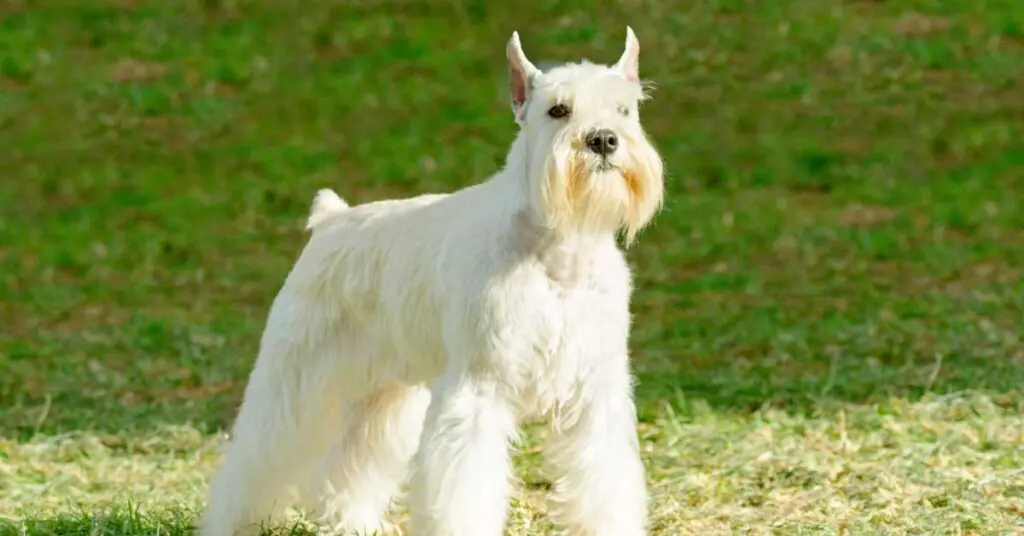Are you curious about the personality of schnauzers? Do you want to understand why they sometimes display stubborn behavior? Well, look no further!
In this article, we will explore the fascinating world of schnauzers and shed light on their unique traits. Schnauzers are known for their distinct appearance, with their bushy eyebrows and signature beard. But it’s not just their looks that make them special – their behavior is equally captivating.
However, one question that often arises is whether schnauzers are stubborn. Stubbornness can be a common trait in schnauzers, but it’s important to understand the reasons behind it. Through this article, we will delve into the factors that contribute to their stubborn tendencies and provide valuable insights into training techniques that can help overcome these challenges.
So, if you’re a proud schnauzer owner or simply interested in these wonderful dogs, join us on this journey of unraveling the mysteries behind schnauzer behavior. Get ready to gain a deeper understanding of your furry companion and foster a stronger bond with them.
Let’s dive in!
Key Takeaways
- Schnauzers have a distinct appearance with bushy eyebrows and a signature beard.
- Clear boundaries and consistent training from an early age are important for managing schnauzer behavior.
- Schnauzers respond well to positive reinforcement and consistency in their routines.
- Recognizing signs of stubbornness in schnauzers includes refusing to obey commands and resisting changes in routine.

Understanding Schnauzer Behavior
You’ll notice that Schnauzers can sometimes be stubborn, but they’re also incredibly intelligent and loyal.
Understanding Schnauzer behavior is essential for managing their temperament effectively.
Schnauzers have a strong sense of independence, which can make them appear stubborn at times. However, this trait isn’t necessarily a negative one. It simply means that they’re confident and have a mind of their own.
To manage their behavior, it’s important to establish clear boundaries and consistent training from an early age. Schnauzers respond well to positive reinforcement and consistency in their routines.
They thrive in environments where they feel a sense of belonging and are given opportunities to use their intelligence.
With the right approach, you can channel their stubbornness into productive behaviors and enjoy a happy and fulfilling relationship with your Schnauzer.
Common Traits of Schnauzers
Get ready for a spirited companion with a personality that can sometimes be a little headstrong. Schnauzers are known for their unique temperament and distinctive behaviors. Understanding schnauzer temperament is key to building a strong bond with these intelligent dogs.
Here are some common traits of schnauzers that you should be aware of:
- Alertness: Schnauzers are highly alert and make excellent watchdogs. They’ll often bark to alert you of any potential danger.
- Independence: Schnauzers have a strong sense of independence and may sometimes prefer to do things their own way. This can manifest as stubbornness in certain situations.
- Energy: Schnauzers are energetic dogs that require regular exercise to keep them happy and healthy. They love to play and explore their surroundings.
- Socialization: Proper socialization is crucial for schnauzers to prevent behavioral issues. They can sometimes be wary of strangers and other animals, so early and consistent socialization is important.
By understanding these common traits and providing the right training and socialization, you can help your schnauzer become a well-behaved and happy member of your family.
Training Techniques for Schnauzers
Mastering the art of training schnauzers is like a dance, as these spirited dogs thrive on positive reinforcement and respond well to consistent and patient guidance. However, it’s important to acknowledge that training schnauzers can present some challenges. Their independent nature and occasional stubbornness may require a bit of extra effort.
Effective communication is key when training these intelligent dogs. Be clear and concise with your commands, using positive reinforcement techniques such as treats and praise to motivate them. Consistency is paramount, as schnauzers need a structured routine to understand what’s expected of them.
Patience is also essential, as these dogs may take longer to grasp certain commands. By utilizing these training techniques, you can establish a strong bond with your schnauzer and overcome any training obstacles that may arise.
The Role of Socialization in Schnauzer Behavior
Discovering the importance of socialization for your schnauzer’s behavior is like unlocking the key to a happy and well-adjusted furry companion. Socialization benefits schnauzers in numerous ways, ultimately shaping their behavior and ensuring they become well-rounded dogs.
Here are four key ways socialization impacts your schnauzer’s behavior:
- Builds confidence: Proper socialization exposes your schnauzer to various people, animals, and environments, helping them develop confidence in new situations.
- Reduces fear and aggression: Early and ongoing socialization helps prevent fear and aggression towards unfamiliar people, animals, and situations.
- Enhances communication skills: Socialization allows schnauzers to learn appropriate communication skills, such as reading body language and understanding social cues.
- Promotes positive interactions: Regular socialization encourages schnauzers to develop positive interactions with other dogs and people, leading to improved overall behavior and a friendly demeanor.
By prioritizing socialization, you create a strong foundation for your schnauzer’s behavior, fostering a well-adjusted and socially adept furry companion.

Recognizing Signs of Stubbornness in Schnauzers
When it comes to recognizing signs of stubbornness in your schnauzer, you might be surprised to find that their determination can be both endearing and challenging.
Schnauzers are known for their strong-willed nature, and it’s important to understand how to deal with their stubborn behaviors.
One common sign of stubbornness in schnauzers is refusing to obey commands or consistently challenging authority. They may also display a strong desire to have things their way, resisting any attempts to change their routine or habits.
It’s crucial to establish yourself as the pack leader and set clear boundaries and expectations for your schnauzer. Consistent training and positive reinforcement techniques can help address their stubborn tendencies and encourage cooperative behavior.
Remember, patience and understanding are key when dealing with a stubborn schnauzer.
Tips for Dealing with Stubborn Schnauzer Behaviors
To effectively handle your feisty schnauzer, it’s helpful to implement consistent training methods and positive reinforcement techniques.
When dealing with stubborn schnauzer behaviors, it’s important to establish yourself as the pack leader and set clear boundaries. Consistency is key, so be sure to enforce rules and expectations consistently.
Use positive reinforcement, such as treats and praise, to reward good behavior and encourage your schnauzer to follow your commands. Effective communication is crucial when managing stubborn schnauzer behavior.
Use clear and concise commands, and be firm and confident in your tone. Avoid getting frustrated or angry, as this can escalate the situation. Instead, remain calm and patient, and always end training sessions on a positive note.
Remember, with the right approach and consistent training, you can successfully manage your stubborn schnauzer’s behavior.
Positive Reinforcement Methods for Training Schnauzers
In order to train your spirited schnauzer, try implementing positive reinforcement techniques. These techniques involve using treats and praise. Positive reinforcement training is an effective method for teaching your schnauzer new behaviors and correcting unwanted ones. This technique focuses on rewarding your dog for good behavior, encouraging them to repeat it.
When your schnauzer follows a command or exhibits desirable behavior, immediately praise them and offer a treat as a reward. Consistency is key when using positive reinforcement, so be sure to reward your schnauzer every time they do something right.
Additionally, keep training sessions short and frequent to maintain their attention and motivation. With this approach, your schnauzer will learn to associate good behavior with positive outcomes, making training a more enjoyable and successful experience for both of you.
Establishing Clear Boundaries and Expectations
By clearly setting boundaries and expectations, you can create a harmonious and fulfilling relationship with your spirited schnauzer.
Establishing clear boundaries is essential in training your schnauzer, as it helps them understand what is acceptable behavior and what is not. Consistency is key when setting boundaries, as it helps your schnauzer understand what’s expected of them in various situations.
Make sure to communicate your expectations clearly and consistently reinforce them through positive reinforcement methods. This’ll help your schnauzer learn and adapt to your household rules.
Setting expectations also plays a vital role in training your schnauzer. Clearly communicate what you expect from them in terms of obedience, socialization, and daily routines. This’ll help your schnauzer understand their role in the family and feel a sense of belonging.
Remember, patience and perseverance are key when establishing boundaries and setting expectations with your schnauzer.
Seeking Professional Help for Stubborn Schnauzer Behaviors
Now that you’ve established clear boundaries and expectations with your stubborn Schnauzer, it may be beneficial to seek professional help for any persistent behavioral issues.
Professional training can provide you with the guidance and expertise needed to address your Schnauzer’s stubborn behaviors effectively. Trained professionals can assess your dog’s specific needs and develop a behavior modification plan tailored to their personality and temperament.
Through positive reinforcement techniques and structured training sessions, they can help you teach your Schnauzer new, more desirable behaviors. Additionally, professional trainers can provide you with valuable advice and strategies for managing challenging situations that may arise.
Remember, seeking professional help isn’t a sign of weakness but rather a proactive step towards creating a harmonious and fulfilling relationship with your beloved Schnauzer.
The Importance of Consistency in Training Schnauzers
Maintaining consistency in training your Schnauzer is like building a solid foundation for a beautiful, well-behaved companion. It’s crucial to understand the importance of consistency when working with a stubborn breed like the Schnauzer.
By consistently reinforcing desired behaviors and discouraging unwanted ones, you’re setting clear expectations for your furry friend.
Here are three key reasons why consistency is vital in training your Schnauzer:
- Establishing Boundaries: Consistency helps your Schnauzer understand what’s acceptable and what’s not. By consistently enforcing rules and boundaries, you’re providing your dog with a sense of structure and security.
- Reinforcing Learning: Schnauzers thrive on repetition. Consistently practicing commands and rewarding positive behaviors helps them understand and retain the lessons you’re teaching them.
- Recognizing Signs of Stubbornness: Consistency allows you to identify any signs of stubbornness early on. By addressing these behaviors consistently, you can work towards modifying them and fostering a more cooperative attitude in your Schnauzer.
Remember, consistency is the key to unlocking the full potential of your Schnauzer and building a strong bond with your furry companion.
Understanding the Influence of Genetics on Schnauzer Behavior
To truly comprehend the impact of genetics on your Schnauzer’s behavior, you must delve into the intricate web of their ancestry and unravel the threads that shape their unique temperament.
Schnauzers have a rich history that dates back to Germany, where they were bred as versatile working dogs. Over time, their genetic makeup has influenced their behavior, making them known for their intelligence, independence, and yes, stubbornness.
However, it’s important to note that genetics is just one piece of the puzzle. The influence of the environment on a Schnauzer’s behavior cannot be underestimated. Proper socialization, consistent training, and a loving, structured home environment all play a significant role in shaping their behavior.
Additionally, it’s important to be aware of common health issues in Schnauzers, such as hip dysplasia, eye problems, and skin allergies, as these can also impact their behavior.
By understanding both the genetic and environmental factors that influence your Schnauzer’s behavior, you can provide them with the best possible care and ensure a harmonious relationship.
Celebrating the Unique Personalities of Schnauzers
Delving into the intricate web of their ancestry, we can truly appreciate the unique personalities that make Schnauzers so special. These lovable dogs possess a distinct set of traits that set them apart from other breeds.
Schnauzers are known for their intelligence, independence, and spirited nature. They have an innate curiosity and a strong desire to explore their surroundings. This can sometimes result in a stubborn streak, but with proper training and management, their behavior can be easily managed.
Schnauzers thrive on mental stimulation and require regular exercise to keep them content. It’s important to provide them with plenty of enrichment activities and socialization opportunities to prevent boredom and potential behavioral issues.
By understanding and embracing the unique qualities of Schnauzers, we can create a harmonious and fulfilling relationship with these remarkable dogs.
Frequently Asked Questions
Are Schnauzers good with children?
Schnauzers are generally good with children and can be a great addition to a family. However, it’s important to introduce them to children properly and teach both the dog and child about safety to ensure a harmonious and safe environment.
How often should I groom my Schnauzer?
To keep your schnauzer looking sharp, groom them every 4-6 weeks. Use a slicker brush to remove loose hair and prevent matting. Trim their coat with grooming scissors and clean their ears regularly.
What are some common health issues Schnauzers may face?
To prevent common health issues in Schnauzers, it’s important to follow Schnauzer grooming tips such as regular brushing, ear cleaning, and dental care. Regular vet check-ups and vaccinations are also crucial for their well-being.
Can Schnauzers be trained to be off-leash?
Training a Schnauzer to be off-leash can be challenging due to their independent nature. However, with consistent and positive reinforcement, using methods like reward-based training, you can achieve success in off-leash training.
Are Schnauzers prone to separation anxiety?
Schnauzers can be prone to separation anxiety. Signs include excessive barking, destructive behavior, and urinating indoors. To address this, consider crate training, gradual departures, and providing mental stimulation. Seek professional help if needed.
Conclusion
In conclusion, owning a Schnauzer can be a rewarding experience, but it also requires understanding and patience. Training techniques, socialization, and consistency are key in shaping their behavior.
If you encounter stubbornness in your Schnauzer, seeking professional help can provide valuable guidance. For example, in a case study, a stubborn Schnauzer named Max initially struggled with leash training. With the help of a professional dog trainer, Max’s owner implemented positive reinforcement techniques and gradually saw improvements in his behavior.
Remember, every Schnauzer is unique, and celebrating their personalities is part of the joy of owning one.






